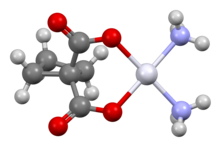
Back كاربوبلاتين Arabic کربوپلاتین AZB Carboplatin Welsh Carboplatin German Καρβοπλατίνη Greek Carboplatino Spanish Karboplatino Basque کربوپلاتین Persian Karboplatiini Finnish Carboplatine French
 | |
 | |
| Clinical data | |
|---|---|
| Pronunciation | /ˈkɑːrboʊˌplætən/ |
| Trade names | Paraplatin, others |
| AHFS/Drugs.com | Monograph |
| MedlinePlus | a695017 |
| Routes of administration | Intravenous |
| ATC code | |
| Legal status | |
| Legal status | |
| Pharmacokinetic data | |
| Bioavailability | complete |
| Protein binding | Very low |
| Elimination half-life | 1.1-2 hours |
| Excretion | Kidney |
| Identifiers | |
| |
| CAS Number | |
| PubChem CID | |
| DrugBank | |
| ChemSpider | |
| UNII | |
| KEGG | |
| ChEBI | |
| ChEMBL | |
| CompTox Dashboard (EPA) | |
| ECHA InfoCard | 100.050.388 |
| Chemical and physical data | |
| Formula | C6H12N2O4Pt |
| Molar mass | 371.256 g·mol−1 |
| 3D model (JSmol) | |
| |
| |
| | |
Carboplatin, sold under the brand name Paraplatin among others, is a chemotherapy medication used to treat a number of forms of cancer.[3] This includes ovarian cancer, lung cancer, head and neck cancer, brain cancer, and neuroblastoma.[3] It is used by injection into a vein.[3]
Side effects generally occur.[3] Common side effects include low blood cell levels, nausea, and electrolyte problems.[4][3] Other serious side effects include allergic reactions and mutagenesis. It may be carcinogenic, but further research is needed to confirm this.[3] Use during pregnancy may result in harm to the baby.[3] Carboplatin is in the platinum-based antineoplastic family of medications and works by interfering with duplication of DNA.[3][5]
Carboplatin was developed as a less toxic analogue of cisplatin.[6] It was patented in 1972 and approved for medical use in 1989.[7] It is on the 2023 World Health Organization's List of Essential Medicines.[8]
- ^ "FDA-sourced list of all drugs with black box warnings (Use Download Full Results and View Query links.)". nctr-crs.fda.gov. FDA. Retrieved 22 Oct 2023.
- ^ "Product monograph brand safety updates". Health Canada. 7 July 2016. Retrieved 3 April 2024.
- ^ a b c d e f g h "Carboplatin". The American Society of Health-System Pharmacists. Archived from the original on 21 December 2016. Retrieved 8 December 2016.
- ^ Oun R, Moussa YE, Wheate NJ (May 2018). "The side effects of platinum-based chemotherapy drugs: a review for chemists". Dalton Transactions. 47 (19): 6645–6653. doi:10.1039/c8dt00838h. PMID 29632935.
- ^ Apps MG, Choi EH, Wheate NJ (August 2015). "The state-of-play and future of platinum drugs". Endocrine-Related Cancer. 22 (4): R219–R233. doi:10.1530/ERC-15-0237. hdl:2123/24426. PMID 26113607.
- ^ Cite error: The named reference
lebwohlwas invoked but never defined (see the help page). - ^ Fischer J, Ganellin CR (2006). Analogue-based Drug Discovery. John Wiley & Sons. p. 513. ISBN 9783527607495. Archived from the original on 2016-12-20.
- ^ World Health Organization (2023). The selection and use of essential medicines 2023: web annex A: World Health Organization model list of essential medicines: 23rd list (2023). Geneva: World Health Organization. hdl:10665/371090. WHO/MHP/HPS/EML/2023.02.
© MMXXIII Rich X Search. We shall prevail. All rights reserved. Rich X Search